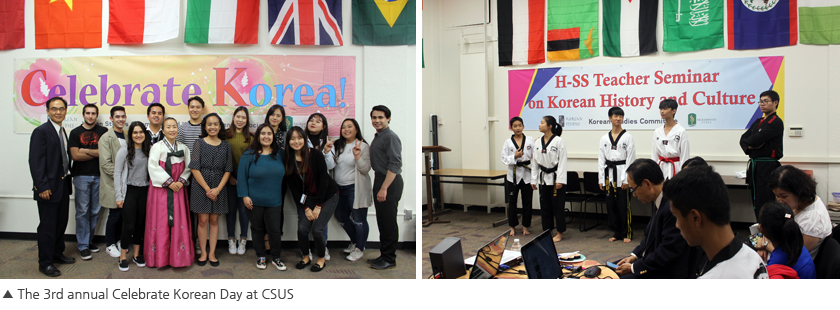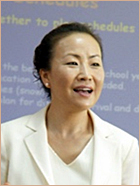Column
Sacramento State Establishes Korean Concentration
Korean courses, including Korean language classes, are being established and maintained at universities all over the world as part of efforts to strengthen Korea’s international presence and build a foundation of global human resources. Korean language and Korea-related courses have been offered regularly at Sacramento State since Fall 2013 as part of this work, and this article aims to introduce the excellent results at this school.
We used advertising to promote the Korean studies program and attract more students to Korean language and content courses. We also distributed new educational materials and information to local social studies teachers and teachers-in-training so they can teach Korean history and culture more accurately. These materials were either revised or newly published to meet the standards of the recently approved K-12 History-Social Science Framework in California (June 2016). We also strove to instill a correct and positive understanding of Korean history, society and culture, and left the teachers with a charge to help their K-12 students truly understand Korea by re-examining the development of modern Korean culture. Additionally, we sought to give students who want to know about or work in Korea an accurate description of Korea’s progress and changes and the excellence of Koreans.
The key achievements of this event are as follows:
- The success of this event was especially meaningful thanks to the fact that new middle and high school text books have been revised and are currently being published in the US. We invited state and county officials as well as current and future teachers who have influence in determining the contents of textbooks. In this way, we were able to lay a foundation for future US middle and high school students to accurately learn about Korean history and culture.
- Current and future social studies teachers and other teachers of similar subjects residing in Northern California listened to lectures and engaged in animated discussions at the event. We were able to correct misconceptions about Korean history and culture.
- There are many social studies teachers-in-training who were unable to properly learn about Korean history during their education. Through our program in May 2019, we provided these students with a foundation to teach detailed and accurate information about Korean culture and history after completing their teacher training programs.
- We announced the contents of the event to the Teachers’ Curriculum Institute, developer and publisher of the History-Social Science Alive Series and one of the leading textbook publishers for US middle and high schools. These textbook developers attended the event, and we explained what parts about Korea need to be changed or added in new history textbooks to be used by current and future social studies teachers. In addition, Professors EunMi Cho and Greg Cho along with KECSF Director Chul-soon Choi had the opportunity to directly participate in the development of Korea related content for the new textbooks. This was made possible thanks to the constant support from the Academy of Korean Studies in Korea. They provided advice and revisions about the Korea content from the beginning through the end of the editing process. The newly published social studies textbook was distributed free of charge to the social studies teachers who attended.
- The participants’ understanding and interest in Korea was increased through Korean traditional dance, K-pop and Korean music performances, Taekwondo demonstrations, and Korean traditional food. Many of the attendees gave positive feedback following the event and expressed hope that the event would be held again in years to come.
- Building on the students’ growing interest in Korea and positive responses from participants, we were able to continue offering lectures on subjects related to Korea in the Spring 2019 semester.
1. History
Chinese studies, Japanese studies, and Southeast Asian studies have been taught since 1995 in the Asian Studies Department at Sacramento State. Even with the rise of Korea’s international status, the study of Korea was not taught at Sacramento State. Therefore, before the establishment of Korean studies through the Korean Concentration, students had no choice but to choose another language to study as a second language. These students included Korean Americans, Koreans who had been adopted at a young age and studied Korean at area Korean language schools through high school, and American undergraduate and graduate students interested in Korea. In addition, students who came to Sacramento State after studying Korean at weekend Korean language schools throughout high school were not able to advance to higher levels of Korean language at Sacramento State or any other university. To help solve this problem, I (Department of Special Education) volunteered along with a group of Korean American professors formed the Korean Concentration Committee (originally Korean Concentration Development Project) in 2010. Planning began the following year, and Korean language courses were formally offered starting 2013 in the World Languages and Literature Department in the College of Arts and Letters. At the same time, Korea related courses, such as ASIA 134 – History of Korea (3 units) and ASIA 135 – History of Korea (3 units), were offered in the Asian Studies Program (College of Social Sciences and Interdisciplinary Studies) for the first time, bringing about the establishment of Korean studies. These efforts were greatly supported by the dean and associate dean of the Department of Asian Studies.2. Factors of success and achievements
Sacramento State is located in California’s capital city and is a large university with more than 30,000 students. Every year, Sacramento State sends many exchange students to several universities in Korea including Yonsei University and Kyunghee University. Despite heightened interest in Korea due to Korean dramas, movies and K-pop, there was no way for students to explore these interests. Increased demand for knowledge about Korea and Korean language also came with an increase in the number of students who participated or were interested in Korean government-led programs like TALK (Teach and Learn in Korea) or EPIK (English Program in Korea). The Korean Concentration was included in the university’s brochure starting in 2017. This was made possible by the passion for Korean studies held by a group of Korean American professors at the university and students’ interest in Korean studies brought about by a desire to work in Korea or to understand Korea more accurately. In addition, over 100 American students are members of the Korean Student Association, led by Professors Greg Cho (Department of Mechanical Engineering) and EunMi Cho (Department of Special Education) which meets every Thursday from 6:30 – 8:30 pm to learn about Korea and experience Korean culture and language.3. Follow up
While Korean language and other Korea-related courses were offered starting in 2013, these courses were not taught by professors who specialized in Korean studies. Rather, American or Korean American professors took up this role while also teaching in their respective majors. Therefore, these professors visited Korea themselves and, through meeting specialists and researching related material, adapted and developed materials for an American university. They used these materials and teaching methods in their Korean language and Korea related courses. There is still a need for professional training and development of better-suited material, and the university still has a need to recruit Korean language and studies professors and develop textbooks.4. Future progress
This marks the sixth year since the establishment of Korean language and content courses at Sacramento State. Up until now, the most popular courses in the Department of Asian Studies had been Japanese language and Japanese studies. However, the number of students enrolled in Korean language and content courses surpassed the number of Japanese studies enrollments in the Fall 2018 semester. In response to this change and recognizing the demand for Korean studies, the Department of Asian Studies in the College of Social Sciences and Interdisciplinary Studies selected a Korean specialist in a tenure track position for the first time in the school’s history. Starting in the Fall 2019 semester, this professor will be the center of the university’s efforts to development Korean studies. After coming to Sacramento State and settling in for a few years, this professor has plans to lead all of the programs in the Department of Asian Studies as the department head.5. Establishing Korean Studies and Steering Committee Activities
In order to spread word about the development of Korea and Korean studies, the Korean Concentration Committee has held an annual “Celebrate Korean Day and H-SS Teacher Seminar on Korean Culture” for the past few years. This event has been funded by the Consulate General of the Republic of Korea and Sacramento State’s One World Initiative for the past three years.We used advertising to promote the Korean studies program and attract more students to Korean language and content courses. We also distributed new educational materials and information to local social studies teachers and teachers-in-training so they can teach Korean history and culture more accurately. These materials were either revised or newly published to meet the standards of the recently approved K-12 History-Social Science Framework in California (June 2016). We also strove to instill a correct and positive understanding of Korean history, society and culture, and left the teachers with a charge to help their K-12 students truly understand Korea by re-examining the development of modern Korean culture. Additionally, we sought to give students who want to know about or work in Korea an accurate description of Korea’s progress and changes and the excellence of Koreans.
The key achievements of this event are as follows:
- The success of this event was especially meaningful thanks to the fact that new middle and high school text books have been revised and are currently being published in the US. We invited state and county officials as well as current and future teachers who have influence in determining the contents of textbooks. In this way, we were able to lay a foundation for future US middle and high school students to accurately learn about Korean history and culture.
- Current and future social studies teachers and other teachers of similar subjects residing in Northern California listened to lectures and engaged in animated discussions at the event. We were able to correct misconceptions about Korean history and culture.
- There are many social studies teachers-in-training who were unable to properly learn about Korean history during their education. Through our program in May 2019, we provided these students with a foundation to teach detailed and accurate information about Korean culture and history after completing their teacher training programs.
- We announced the contents of the event to the Teachers’ Curriculum Institute, developer and publisher of the History-Social Science Alive Series and one of the leading textbook publishers for US middle and high schools. These textbook developers attended the event, and we explained what parts about Korea need to be changed or added in new history textbooks to be used by current and future social studies teachers. In addition, Professors EunMi Cho and Greg Cho along with KECSF Director Chul-soon Choi had the opportunity to directly participate in the development of Korea related content for the new textbooks. This was made possible thanks to the constant support from the Academy of Korean Studies in Korea. They provided advice and revisions about the Korea content from the beginning through the end of the editing process. The newly published social studies textbook was distributed free of charge to the social studies teachers who attended.
- The participants’ understanding and interest in Korea was increased through Korean traditional dance, K-pop and Korean music performances, Taekwondo demonstrations, and Korean traditional food. Many of the attendees gave positive feedback following the event and expressed hope that the event would be held again in years to come.
- Building on the students’ growing interest in Korea and positive responses from participants, we were able to continue offering lectures on subjects related to Korea in the Spring 2019 semester.



